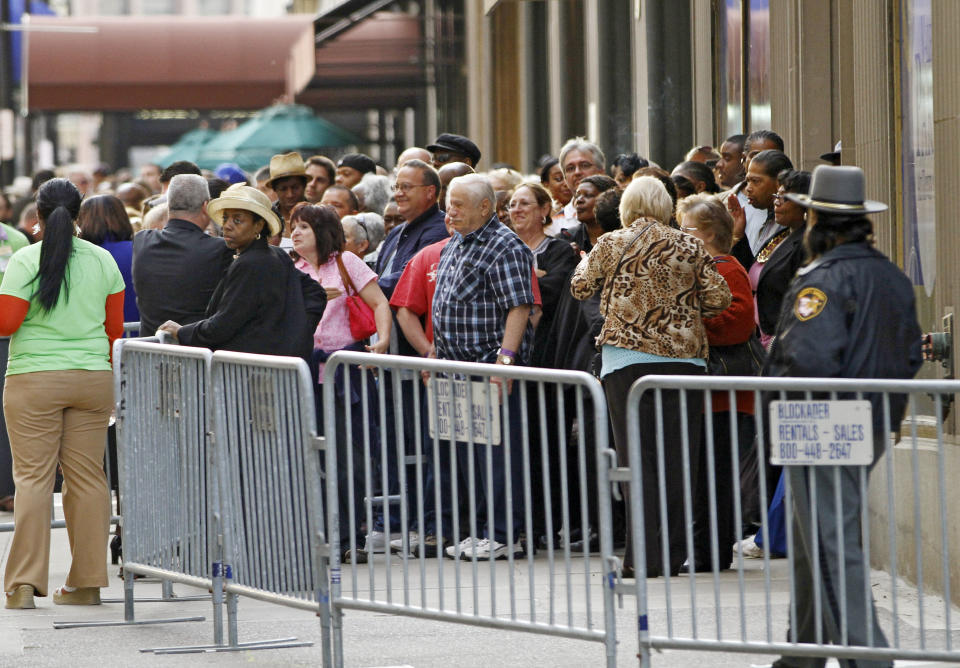Ohio casinos will cut into nearby states' winnings
TOLEDO, Ohio (AP) — The opening of casinos in Ohio this spring means the luck is running out for neighboring states that have pulled in an estimated $1 billion each year from gamblers who've been crossing the border to wager at riverboats in Indiana, gaming tables in Michigan and casinos in western Pennsylvania.
With more Ohioans staying home to gamble, those states stand to lose millions in tax revenues that help pay for new schools, college scholarships, roads and bridges.
Cash-starved states are increasingly leaning on gambling money from new casinos to get them through lean times, yet there are concerns the rapid expansion of casino gambling is saturating the market.
Indiana alone estimates it will lose as much as $100 million in tax revenue in the first year after all four of Ohio's casinos are operating.
Casinos came to Indiana in the mid-1990s and now are the state's third-biggest revenue generator behind sales taxes and income taxes, bringing in just over $10 billion in tax money since its riverboat casinos first opened. Wagering and admission taxes raised $860 million in the state's last fiscal year. But the numbers have been slipping the past three years because of increased competition and the economy.
"We were shockingly successful in the early years," said Luke Kenley, a state senator who's a key member of Indiana's budget committee. "But other states have chipped away at us."
Its biggest threat now is a new casino under construction in downtown Cincinnati that's just a half-hour drive from one of Indiana's most profitable casinos in Lawrenceburg.
The casinos that draw Ohio customers aren't going to give them up without a fight. They've spruced up their gaming areas, added entertainment offerings and increased advertising. West Virginia's legislature created a fund to help casinos buy new slot machines.
Ohio's first casino opened in Cleveland two weeks ago and is expected to draw away customers from gaming tables in Pennsylvania and western New York.
A second casino that opens in Toledo on Tuesday will be in direct competition with three sites that are just 60 miles to the north in Detroit. Gaming analysts think Detroit's casino could lose up to 5 percent of their revenues, and the city is bracing for a $25 million loss from its take of casino money in the upcoming fiscal year.
It simply stands to reason that gamblers who have flocked to Detroit from northern Ohio the past two decades will go to the casino that is closest to home, said Jake Miklojcik, a gaming industry analyst in Michigan.
"I call it couch to slot time," he said. "Convenience is the most important factor, because all the games are really the same."
Ohio's neighboring states, for the most part, are waiting to see how their casino revenue is affected before making any cuts. Some target that money toward education while others, including Indiana, put gambling taxes into their general fund.
Ohio expects to collect about $600 million from taxes on casino wagering, with most going to schools and local governments.
The state's voters had rejected four attempts to open casinos before 2009 when they approved gambling halls in Ohio's four biggest cities. Backers promised it would help the state's floundering economy by bringing new jobs and stopping the flow of money to out-of-state casinos.
"It's Ohio's money now," said Scott Baillie, a poker and blackjack player from the Toledo suburb of Holland who no longer plans to make monthly trips to Detroit's casinos. "It's fantastic. Everything stays local, look at how many jobs they've created."
Toledo's casino will employ 1,300 people, both full and part-time.
The owners of Mountaineer Casino & Resort in West Virginia spent $6 million campaigning against Ohio's entrance into casino gambling.
West Virginia had little nearby competition for nearly two decades after racetracks began adding gaming machines in the 1990s. Six years ago it was second only to Nevada in the share of its state budget that comes from gambling revenues, with much of that money going to school construction and student scholarships and grants.
Now it's feeling the squeeze from Ohio, Pennsylvania and Maryland — all relative newcomers to the casino industry.
West Virginia is bracing for a 20 to 40 percent drop in sales at its racetrack casinos, said Jim Toney, a deputy director with the West Virginia Lottery.
To make sure West Virginia's four casinos stay competitive, state lawmakers set up a fund last year that allows the casinos to split up to $10 million a year so they can buy new slot machines. The fund matches $1 for every $2 the casinos spend on upgrades.
Keeping the casinos updated should help them win back customers, Toney said.
"It's like a supermarket or a Pizza Hut, when you put a new one on the corner everyone wants to shop at the new store," he said. "Over time, there's a gradual return to the old neighborhood."
Indiana has tried to help out, too.
Lawmakers allowed casinos to be exempt from new statewide smoking restrictions adopted this year after gaming operators said customers would go elsewhere if they couldn't light up while gambling.


